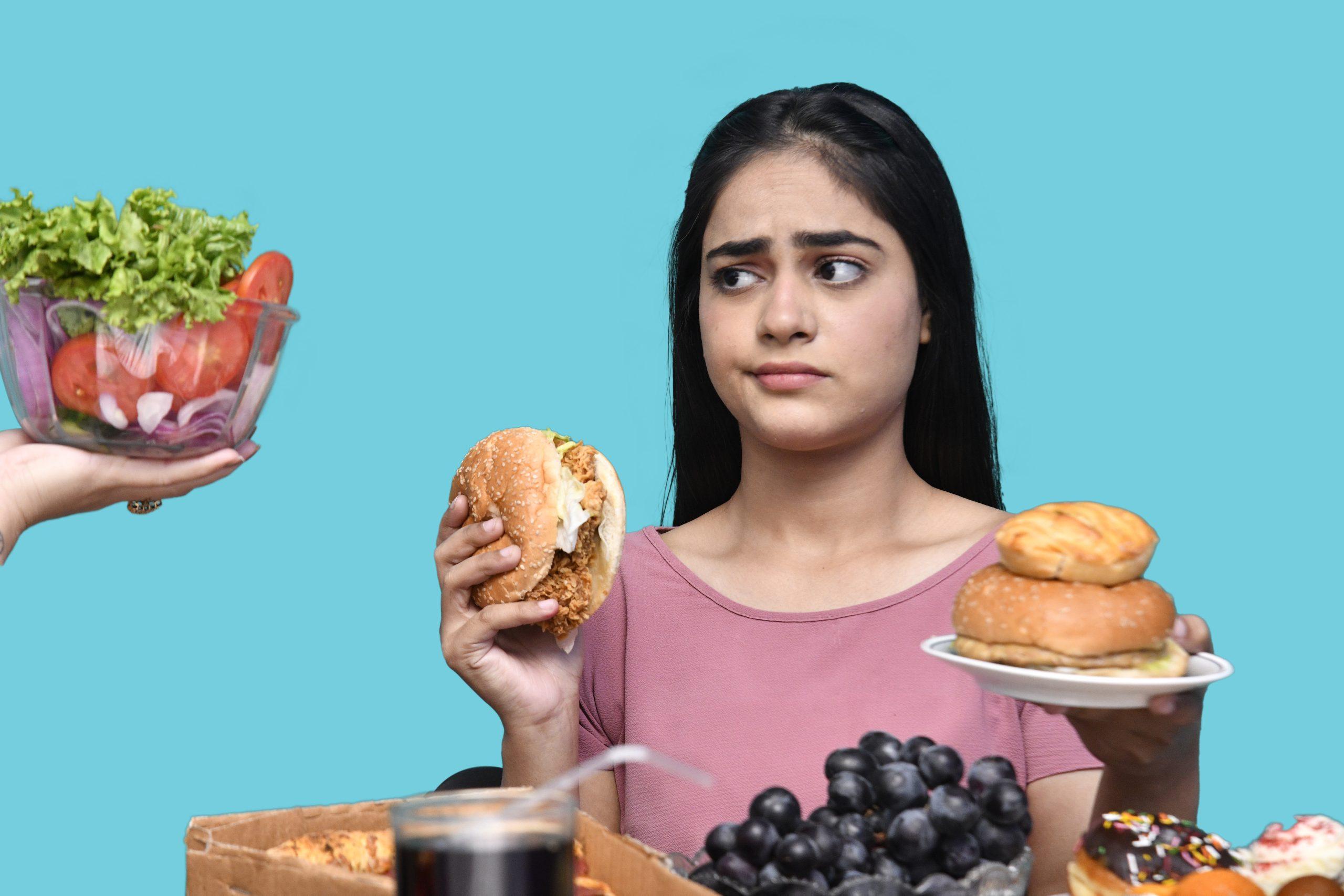
Are you having Irritable Bowel Syndrome (IBS) and often feel worried about food choices as they may trigger cramps, bloating, gas, diarrhoea, or constipation?
Don’t worry; identifying and avoiding specific foods that can trigger these symptoms, monitoring your fibre intake, and opting for low-fat foods are some dietary strategies that may help bring relief.
This article guides the dietary management of irritable bowel syndrome. It discusses the low-FODMAP diet, gluten-free diet, and common recommendations for an IBS-friendly diet.
It is a common gastrointestinal disorder seen by doctors. Given the symptoms that the disease causes, it’s no surprise that patients with IBS can experience a significant impact on their quality of life. Common symptoms include bloating, stomach pain, diarrhoea, constipation, distention, incontinence, and food intolerance.

If you have IBS-D, what triggers your symptoms might not be the same as someone with IBS-C. For those with mixed-type IBS, triggers could be a combination of factors. Individuals might transition between different IBS types over time, such as from IBS-C or IBS-D to IBS-M. Even within the same subtype, identifying and avoiding specific foods that trigger symptoms varies for each person.



FODMAPs (fermentable oligosaccharides, disaccharides, monosaccharides, and polyols) are short-chain, hard-to-digest carbohydrates found in many foods. They tend to ferment and draw more fluid and gas into the intestines, causing bloating, pain, and diarrhoea, which are hallmarks of IBS. Thus, eliminating high-FODMAP foods can help ease or prevent these symptoms.
A study shows that people on a low FODMAP diet experience less cramps and bloating compared to those on a regular diet. The low FODMAP diet isn’t meant to be a long-term plan; it’s a short-term strategy to ease symptoms while pinpointing specific triggers. This diet includes three steps.
Elimination- Foods high in FODMAPs are removed from your diet for two to six weeks.
Reintroduction- FODMAPs are reintroduced into the diet. One food at a time to discover which ones cause issues.
Personalization- Finally, you modify your diet to include a wider variety of foods. Adjust the type and amount of FODMAP carbs based on what you learned during the reintroduction phase.

It is important to note that many common foods are high in FODMAPs. Therefore, it is recommended to consult a gastroenterologist before beginning this diet to avoid overly restrictive meals and ensure a balanced approach.
Gluten is a protein present in grain products, including bread and pasta. This protein can damage the intestines in those with gluten intolerance.
In cases where people have sensitivity or intolerance to gluten, they may experience IBS symptoms when consuming a gluten-containing diet. Such patients report an improvement in symptoms when they eliminate gluten from their diet.
A small study conducted in 2016 involving 41 people with IBS indicated that following a gluten-free diet for 6 weeks reduced symptoms. Those who continued to follow the diet for 18 months showed a further improvement in symptoms.
To test if eliminating barley, rye, and wheat helps, cut out foods like bread, cereal, crackers, pasta, certain sauces, malt vinegar, and beer.
Dietary management of Irritable Bowel Syndrome often involves adopting a holistic approach to dietary choices, beyond the specific considerations of FODMAPs and gluten. Here are some general dietary recommendations:


IBS-C: Increase fluid intake and consume prunes, kiwi, and other fruits with natural laxative properties. Whole grains and legumes can also help in regular bowel movements.
IBS-D: Opt for a low-FODMAP diet to alleviate symptoms. Incorporate easily digestible foods like bananas, rice, and plain crackers. Probiotic-rich foods, such as yoghurt, may also help restore gut balance.
Figuring out what to eat when you have IBS can be quite tricky because there’s no single diet or medicine that works for every patient. While medical intervention is important in treating IBS, certain diets may also help.
If your symptoms do not fully resolve with a low-FODMAP or gluten-free diet, it’s crucial to consult a gastroenterologist. Dietary management of irritable bowel syndrome varies for each person and a gastroenterologist can help create a personalized treatment plan based on your specific symptoms.

It is always advisable to consult with an experienced doctor for personalized advice and an accurate diagnosis. Dr. K V Dinesh Reddy is known for his expertise in Irritable Bowel Syndrom Treatment in Hyderabad With a proven track record of performing multiple liver cancer surgeries, he specializes in liver disease management and gastrointestinal oncological surgeries.
You can trust our expertise and dedication to providing exceptional care for your colorectal cancer treatment.
Irritable Bowel Syndrome (IBS) is a common gut disorder causing belly pain, bloating, and changes in bowel habits. It’s not a disease but a collection of symptoms. People with IBS may experience diarrhea, constipation, or both. Stress, certain foods, and hormonal changes can trigger symptoms. Doctors diagnose IBS based on symptoms and medical history. Although there’s no cure, managing stress, diet, and lifestyle changes can help control symptoms. Treatment may include dietary changes, medication, and stress management techniques to improve quality of life for those with IBS.
Alcohol can make IBS symptoms worse. It irritates the digestive tract, leading to stomach pain, bloating, and diarrhea, common symptoms of IBS. Drinking alcohol can also mess with gut bacteria, which affects digestion. Some people with IBS find that even a small amount of alcohol can trigger symptoms. It’s best to avoid alcohol if you have IBS, or at least limit how much you drink. Sticking to non-alcoholic drinks like water or herbal tea can help manage symptoms better.
Sure! Yep, probiotics can help IBS. They’re good bacteria that make digestion better and ease stuff like bloating and tummy pain for some folks with IBS. They do this by fixing up the balance of bacteria in your gut. But, not everyone with IBS finds probiotics helpful. So, it’s super important to chat with your doc before giving them a try. Your doc can suggest the best probiotic for you based on what you’re feeling and what your body needs.
Weight management plays a big role in controlling IBS symptoms. When you keep a healthy weight, it helps ease the stress on your gut, making it easier for your digestion. Extra weight can put more pressure on your belly, leading to more discomfort and worsening IBS symptoms like bloating and pain. Eating a balanced diet and staying active can help maintain a healthy weight, which in turn can lessen the intensity of IBS symptoms. So, by managing your weight well, you can often feel better and have fewer troubles with IBS.
Symptoms of IBS (Irritable Bowel Syndrome) include belly pain or cramps, bloating, gas, diarrhea, and constipation. Some folks might also feel like they can’t fully empty their bowels or have urgent needs to go to the bathroom. It’s common for symptoms to come and go, sometimes triggered by certain foods, stress, or hormones. While IBS can be uncomfortable, it’s not harmful to your intestines.

Our goal is to deliver quality of care in a courteous, respectful, and compassionate manner. We hope you will allow us to care for you and strive to be the first and best choice for your family healthcare.
© 2023 Dr.DineshReddy | Designed by Ramit Solutions